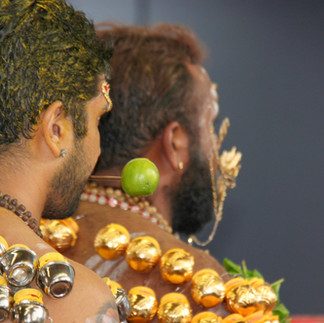Thaipusam is a vibrant and spiritually-charged event that draws devotees and spectators alike. It's a significant Hindu festival celebrated by the Tamil community which first originated in South India, but now the biggest celebrations are right here in Singapore and Malaysia. This annual festival, dedicated to the Hindu deity Lord Murugan, is marked by elaborate processions, intense rituals, and remarkable acts of devotion.

Historical and Religious Significance
Thaipusam holds deep historical and religious roots, dating back to Hindu mythology. It commemorates the occasion when the goddess Parvati presented a spear to Lord Murugan to vanquish the demon Soorapadman. Devotees believe that by participating in Thaipusam, they can seek Murugan's blessings for the removal of obstacles and the fulfillment of their wishes. The festival typically falls in the Tamil month of Thai, some time in January pr February.
This year, Thaipusam is set to be celebrated in Singapore on Thursday, January 25. The procession will start at 11.30 pm on January 24, as devotees walk from Sri Srinivasa Perumal Temple to the Sri Thendayuthapani Temple.
The Preparation
Preparations for Thaipusam begin well in advance, as devotees undertake various acts of penance, such as fasting and prayer, to purify their minds and bodies. Many participants take a vow called kavadi, a physical burden they carry during the procession as an offering to Lord Murugan. Children and women may carry a kavadi such as a simple pot of milk whereas young men may carry elaborate constructions adorned with flowers and peacock feathers which often weigh between 25 and 30 kg (55-65 lbs).
The Day of Thaipusam
On the day of Thaipusam, the atmosphere is electric with spiritual energy. Devotees gather at Sri Srinivasa Perumal Temple, where the festivities start with religious rituals and prayers. Then the highlight of Thaipusam begins: an eye-popping four kilometer procession, where devotees carry their kavadis and walk in a trance-like state towards the temple dedicated to Lord Murugan, Sri Thendayuthapani Temple.
The Piercing Ritual
One of the most awe-inspiring aspects of Thaipusam is the piercing ritual, where some devotees pierce their bodies with sharp objects, such as hooks, skewers, or small spears. This act, known as Vel Kavadi, symbolizes sacrifice, endurance, and the triumph of good over evil. The pierced devotees, often in a deep meditative state, walk the entire procession route, showcasing their unwavering faith and dedication. Some even walk on shoes which are made on a bed of nails.
Cultural Celebration
Thaipusam is not only a religious event, but also a cultural celebration that brings communities together. The streets come alive with the rhythmic beats of traditional music, vibrant dances, and the aroma of incense. Families and friends gather to witness the spectacle, and many join in the festivities, enjoying the rich tapestry of colors, sounds, and flavors that define Thaipusam.
And onlookers are welcome. So if you're living in Singapore and are curious, you should head down to the parade path or one of the temples. Devotees and their families are very proud of their tradition and are more than happy to share it with you. They're happy for you to take photos as long as you're not intrusive and don't get in the way of the festivities. One expat woman I know made friends with a devotee's family and spent the entire day with them following the festivities.
Conclusion
Thaipusam stands as a testament to the enduring spirit of devotion and sacrifice within the Hindu community. It is a celebration that transcends cultural and geographical boundaries, offering a unique blend of religious fervor, cultural heritage, and communal joy. It is truly a festival unlike any other.




































Comentários